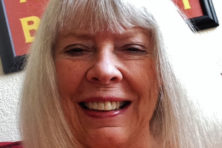The Poetry of Sharon Auberle
- Share
- Tweet
- Pin
- Share
After many years of dividing her time between our northern woods and the Southwest, Sharon Auberle has settled full time on the sheltering pines and open waters of Door County. She celebrated her permanent return by getting not one but two collections of her poems published. (See the interview for further details.) Here are just a few thoughts of our own to mark the year ‘round residency of Auberle and her art.
Two themes resonate through Sharon Auberle’s two books of poetry. In the first, Crow Ink, she considers her relationship with nature and in so doing, speaks for a wider tribe as well. One supposes that one way to poetize about nature is simply to admire it for one reason or another, “I think that I shall never see a poem as lovely as a tree” so to speak or, to reach for something grander – “Glory be to God for dappled things…” Such admiration is deeply significant for an age in which we seem to have lost our connection to the natural world from which we come. But Auberle is a poet of prodigious energy and passion whose words conjure on the page a meta-nature that will not let is drift away so easily. She writes of nature as both her lover and her protector, making her both song and singer, Gaia’s flesh daughter and spirit warrior.
On this day I’m possibilities, as well as memories.
I am this poem and poetry yet to be written.
I’m wind and light and sun, shadow, eagle and crow.
Today I’m the hours and minutes of my life,
tumbling through space, like ravens
riding the updrafts, then freefalling
down dark, dark canyons.
(from “2/20/2000” on p. 54 of Crow Ink.)
Earlier in this poem, Auberle mentions the death of her mother. This experience forms the frame for a truly remarkable book of poetry: Saturday Nights at the Crystal Ball. (Again, see the interview for further details.)
There is a small piece of bronze, no more than six or eight inches tall, in the Boston Museum of Fine Arts. It is the shape of a Greek warrior in stride, just in silhouette. The miracle of this small masterpiece is the way it conjures out of its small presence the entire monumentality of the Trojan War. This is how compression intensifies the psychic and metaphysical power of a work of art. It is the order of power generated in Sharon Auberle’s 48-page memoir of her parents in Saturday Night.
This is a very personal book. The poems are framed by Auberle’s vigil as her 86-year-old mother nears death. As part of that ritual, Auberle remembers her young mother and father, both through the aid of photographs. Most importantly, she recalls the role that social dancing played in her mother’s way of living and loving life. As a narrative, the poems work like the photographs that inspire them, leaving small, sparse impressions of the events, but most importantly, of the father, present early on but then, too soon, absent. The connective tissue that holds these poems together is the negative space between them, throbbing with longing and mystery and then made doubly poignant by the hand written journal guiding the reader through Auberle’s vigil. In the end, the whole reverberates so deeply to the common ritual of loss that it lifts the sum of its parts to a profound communion. Saturday Nights at the Crystal Ball is a double elegy – part to a parent too soon gone and the other part to a parent closely held – presented with such compassion as to touch anyone who carries the similar feelings with a profoundly healing grace. These poems are intensely personal and private and need never to have been set before the eyes of strangers. Yet I, for one, am deeply grateful for the brave generosity that prompted Sharon Auberle to do so.


